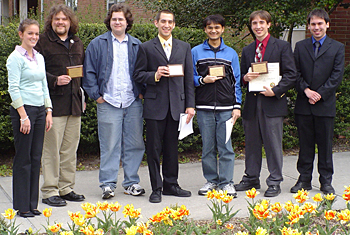
UD participation in the event is a tradition, according to John Burmeister, Alumni Distinguished Professor of Chemistry and Biochemistry, who said, “The annual Intercollegiate Student Chemists Convention [ISSC], which was first held in 1936, is the oldest solely undergraduate research symposium in the country. UD has a long and proud history of participation. Since record-keeping began in 1949, our chemistry and biochemistry majors have received more awards for their presentations (89) than any of the other 60 colleges and universities that have been represented at the ISCC during this period. Ursinus College is in second place, with 69 awards.
“UD is the only Ph.D.-granting institution, of the 61 schools, that has had a consistent record of participation. The closest school to UD, in this category, is Temple University, with 13 awards. This speaks volumes about the current and historical importance of undergraduate research in our program.
This year's UD participants included:
Andrea Passarelli, a junior chemistry major from Voorheesville, N.Y., who competed in the organic chemistry II category. Passarelli presented "Bromomandelate Formation and Addition of Ethyl Acrylate to a Cyclic Bromomandelate,” work she completed with faculty mentor Douglass Taber, professor of chemistry and biochemistry. Passarelli is vice president of the American Chemical Society [ACS] student affiliate at UD.
Rich Karpowicz, a senior biochemistry major, from Lawrenceville, N.J., who took first place in the organic chemistry II competition for his presentation on "Synthesis of Metalofoldamers as Enantioselective Catalysts." Karpowicz was the 2006 recipient of the Pfizer Summer Undergraduate Research Fellowship and is president of the ACS student affiliate at UD. His faculty mentor is Joseph Fox, assistant professor of chemistry and biochemistry.
James Nelson, a senior biochemistry major from Newark, who competed in the biochemistry division, presenting "Design of Coiled-Coil Leucine Zippers for Use in Two- and Three-Dimensional Nanostructures." Nelson, who won second place at a similar competition last year, is mentored by Kristi Kiick, assistant professor of material science and engineering.
John Meyers, a junior chemistry major from Newark, who took second place in the inorganic chemistry category. Meyers presented "A New Family of Intermetallic Compounds of the Rare-earth (RE) Elements Pr, Nd, Sm, Gd, Tb, Dy, Ho, Er. : Synthesis and Structural Characterization of RE2CdGe2.” His faculty mentor is Svilen Bobev, assistant professor of chemistry and biochemistry.
Tapan Patel, a senior from Newark, majoring in biochemistry and math. Patel took second place in the biochemistry competition for his presentation on"Predicting the Structure of Prox1-PCNA Complex." His faculty mentor is Melinda Duncan, associate professor of biological sciences.
Patrick Knerr, a junior biochemistry major from Emmaus, Pa., who took first place in the biochemistry competition for his presentation, "Zinc-triggered Hydrogenation of Designed Beta-Hairpin Peptides." His faculty mentors are Joel Schneider, associate professor of chemistry and biochemistry, and Colin Thorpe, professor of chemistry and biochemistry.
Dan Silverio. a senior chemistry major from Dover, who competed in organic chemistry II. Silverio presented_"A New Method for the Deprotection of Aryl mesylates." He was the sophomore class representative to the chemistry and biochemistry undergraduate curriculum committee and secretary of the ACS student affiliate. His faculty mentor is Douglass Taber, professor of chemistry and biochemistry.
"The University of Delaware has an outstanding undergraduate research program,” Hal White, professor of chemistry and biochemistry, said. “Much of the data in a [recent] highly positive article in Science Magazine about the value of undergraduate research [www.sciencemag.org/cgi/content/full/316/5824/548] uses data gathered from UD. Venues like the ISCC enable chemistry and biochemistry students to present their work and appreciate the opportunities they enjoy. It is really satisfying to go to these conferences year after year and see our students do so well."
Article by Beth Thomas


